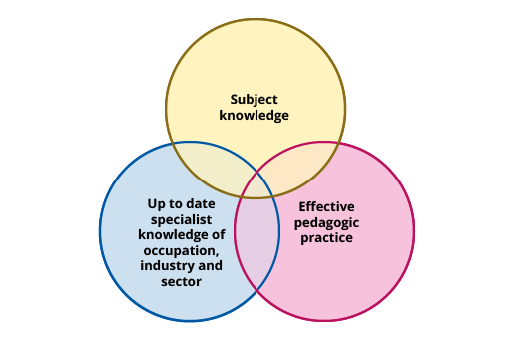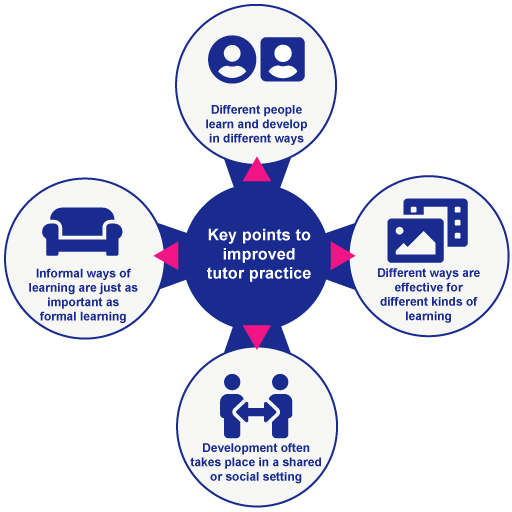Use 'Print preview' to check the number of pages and printer settings.
Print functionality varies between browsers.
Printable page generated Monday, 23 February 2026, 12:37 AM
Part 6 From STEM practitioner to OU tutor
6.1 Making the change
By Diane Butler
As you learned in Part 2, Open University tutors require a broad set of personal attributes, skills and values to be successful in the role. These qualities are reasonably generic across all aspects of the tutor role so the personal attributes which make for a good tutor in one subject are very likely to be the same in any other.
However, there are specific differences between tutors in different disciplines and that is, of course, the subject-based knowledge and any related workplace experience they bring to their role.
In many countries the university workforce is changing, with many people from a variety of different professions, embarking on a parallel career as a higher education (HE) educator. The sector describes these staff as dual or blended professionals as they combine their practitioner role in industry or other settings with a teaching role. The experience of these dual professionals is immensely valuable in teaching settings.
Students often report that exposure to teachers who have real expertise in the workplace makes a significant difference to their learning and helps them recognise the relevance of their learning to real-world issues, and to their own future employability.
In addition, it is suggested that dual professionals offer a bridge between the HE sector and the needs of industry/professional practice.
This may well resonate with your motivation to consider teaching with the Open University. You may wish to combine your career in industry or other fields with some teaching, perhaps because you want to give something back to the discipline field you belong to or because you feel that you would enjoy developing the next generation of professionals in your field.
Whatever your motivation, your subject expertise and workplace experience is highly valuable, but it is important to acknowledge that you may be a novice in the new environment of education.
Activity 1 
What added dimension do you feel that this idea of the dual professional can bring to the tutoring of Open University students?
Do you agree that tutors with a combination of teaching expertise and specialist/subject based knowledge and its application in other sectors can be of value for students?
Write a short post to the discussion forum which explains your views. Read and comment on other forum contributors’ postings, particularly where there are common or radically different views or emerging ideas.
The OU is very conscious of its responsibility to assist tutors in their development as educators in HE and all, regardless of their background in education, are supported to become teachers in their subject and in supported open learning – the OU’s method for delivering quality open and distance learning (Part 3.3). This developmental support occurs in two distinct phases:
- Induction – describes the training and development opportunities offered to tutors within their first two years or probationary period.
- Continuous professional development (CPD) - describes the ongoing commitment to further development in the tutor role.
6.2 Induction
All new tutors are expected to participate in a formal tutor induction. This has two components:
- A module-based induction with specifics about the module and its content including how it is assessed and how tutorials are presented.
- A role-based induction about the generic aspects of the role e.g. running tutorials, delivering correspondence tuition.
Transcript
Digital skills for supporting and managing students
The OU tutor role involves supporting students both pastorally and academically. These two elements are referred to as generic or role specific …and module specific aspects.
When applicants submit applications for tutor posts the OU requires them to address how well they match the generic aspects of the tutor role as well as the module specific elements.
The generic, pastoral elements of the role are very similar regardless of the subject or the module the student is studying and the new tutor’s induction focusses on the methods and mechanisms used to provide this pastoral support.
Key pastoral elements include welcoming students to the module, making proactive contact to offer support and guidance and supporting the student to develop study skills.
During and after induction a wealth of information is provided online to support tutors in this part of their role, this includes the online tutor portal TutorHome and the student portal StudentHome.
For the academic support of their students most tutors rely heavily on the module website, the tutor website for the module and the tutor forums.
Induction pinpoints these valuable resources and ensures new tutors can navigate to the information they need, whether this concerns preparing and running tutorials, marking assignments or support with the module content and the pedagogic approach to the subject matter.
In addition to this wealth of digital information induction of new tutors is supported and facilitated by people who will work closely with the tutor from the outset. The two most significant people in the early days of a new tutor’s career are the Staff Tutor and the Mentor.
Two key people support new tutors through the induction process:
- The Staff tutor
- The Mentor
Mentoring is a vital role in the OU, and the next section outlines what the mentor does and the vital nature of the support they offer.
6.2.1 Tutor mentoring
All new tutors are allocated a mentor, usually an experienced tutor on the same module or a similar module, who provides support and advice on an individual basis. The mentor role is flexible and is designed to meet the needs of the incoming member of staff.
For new tutors with little previous teaching experience mentors are likely to concentrate on the core basic teaching activities – running tutorials and correspondence tuition. Mentors can provide a whole range of support in these areas, ranging from inviting new tutors to sit in on their online tutorials to sharing resources and techniques around marking students’ scripts.
This peer support is both reactive and proactive and the idea is to provide support and guidance when needed.
In this video, Diane, an Associate Dean, asks Mary and Vicky to say little bit about their background and experience as tutors with the OU.

Transcript
6.2.2 For the mentor
Mentoring is a mutual learning relationship. If it works well the mentor finds the experience rewarding by exploring new ideas and ways of working and getting a chance to reflect on their own practice.
The following comments were gathered from a mentoring feedback exercise.
"It was useful to both of us. Often it was more of a discussion of issues and problems which enabled both of us to clarify them rather than a one-way advice-giving relationship."
"It has helped me to articulate assumptions about the nature of the work and to re-examine them."
"Meeting a new fellow-tutor can generate new ideas even with an 'old lag' like myself!"
"I enjoy the contact we had – the opportunity for part-time staff to assist one another in the OU is not always present and this system allows that to happen."
In this video, Mary and Diane discuss the role of a tutor mentor and what is expected of them.

Transcript
6.2.3 For the mentee
From the same study, mentees indicated that they appreciated having someone available for seemingly 'trivial' questions, as well as for detailed advice on the module or teaching. Some found it useful to hear from mentors about parts of the module that students found difficult. Being an OU tutor can be isolating and mentees say that the most useful thing about mentoring is knowing that 'someone is there' to contact quickly if a query or problem arises.
The best mentors are probably those who both guide and respond flexibly to the varied needs of a colleague in a new teaching/learning situation. The mentor acts as a sounding board and offers encouragement to new colleagues, as they gain confidence from their own experience.
The job of a mentor in the OU is to:
- Be proactive in making early contact with a new member of staff (contacting them as soon as possible after their appointment) and suggest a structure to the mentoring process. The relationship can become more flexible as it progresses.
- In some instances, the Staff Tutor may ask a mentor to brief the mentee on the content and delivery of the module itself.
- Be available online and /or the telephone, particularly in the early weeks of the mentee's employment, to advise and encourage on all aspects of the job.
- Make contact before and after the first tutorial.
- Make contact around the time of the first tutor-marked assignment (TMA) cut-off date
- Be a continuing resource for the mentee during their first year.
- Be interested in the new member of staff's previous experience and, how it relates to this new role, not assume 'being new means knowing nothing'.
- Share experience.
- Find out answers to questions they cannot answer themselves.
In this video, Vicky talks about whether it is helpful to have a mentor and gives an example of how they can help a mentee tutor like her.

Transcript
Activity 2 
Think about any experiences you have had in other settings regarding being mentored or being a mentor.
What aspects of mentoring worked well for you?
What would you describe as the essential qualities of a successful mentoring relationship?
Having watched all three videos of Mary and Vicky discussing the relationship between the mentor and the mentee, do their experiences resonate with the essential qualities of a successful mentoring relationship you described above?
Comment
6.3 Continual professional development
Continual professional development (CPD) or educational development/academic professional practice as it can sometimes be called, has become much more prominent in the higher education (HE) sector since the 1990s.
In 2003, The Future of Higher Education White Paper proposed a UK Professional Standards Framework for teaching and supporting learning (UK PSF) was needed. The UK PSF was launched in 2006 and revised in 2011.
The UK PSF aims to foster professional approaches to supporting learning. Another key objective is to make students and other stakeholders aware of the professionalism that the staff bring to their teaching. Further, it provides a means of demonstrating that professional standards are supported through an institution’s development programmes.
For staff entering Higher Education without a previous background in teaching the UK PSF can be a daunting read. It’s easy to feel that the areas of teacher professional activity are alien and somewhat impenetrable. However, it is perfectly possible to enter teaching and acquire the required skills ‘on the job’ provided tutors bring their own development needs to the fore in the first few years.
CPD and The Open University
Professional development is not an ‘event’ or something that is delivered to tutors. All staff must take responsibility for their own learning and development as professionals. However, the OU has a very strong commitment to helping staff develop their skills and expertise in teaching and supporting learning.
As a result, it provides a rich range of resources to assist tutors in doing this, as detailed below:
A wide range of web-based resources to support tutors in their teaching – for instance, on supporting diversity or disability
Resources provided by the module team to assist tutors in preparing their tutorials or with correspondence tuition
The Development Fund, which enables tutors to apply for funding to support attendance at a conference or to undertake other developmental activities or studies
Access to a fully online academic library
A fee waiver for OU modules so tutors can take most OU modules/qualifications at no charge including the opportunity to complete a research degree
Support to conduct pedagogic research via funding and staff development provided by eSTEem: The OU Centre for STEM pedagogy.
And most importantly, the OU provides a full programme of development activities specifically to support tutors in their work. These activities can take place face-to-face in a variety of venues or online and enable tutors to get together with each other and with their line managers to support and to share best practice.
These hugely enjoyable events bind together OU staff into a diverse and rich academic community where explorations of the best way to tutor our students and to support their learning are the key focus of discussions.
6.4 Ways of developing as an OU tutor – what tutors say
When OU tutors are asked how they came to develop their skills or extend their knowledge as teachers, they frequently list the following experiences:
- Training courses or events
- Materials – in print or online
- The influence of another person – in a presentation or by example in their practice, for example:
- Feedback either from students or after observation by a colleague – an informal discussion with students or colleagues
- In response to the changing demands of the job and/or the need for updating – in recognition of the distinction between development that is essential as opposed to desirable
- Research or further study
- Engaging in practitioner enquiry – into their own practice or by feedback on their performance.
You may be able to draw parallels here with the type of CPD you have undertaken in your current role(s).
Activity3 
Make a note of ways in which you have improved your own professional practice in your current role, in this case focus not on your subject expertise but on the related work skills and issues such as communications, project management or supporting others to succeed. This may have been through formal CPD events or by other less direct methods.
Of these, which do you feel is the most effective approach?
Could you envisage any difficulties in acquiring CPD in a distributed organisation such as the Open University?
Comment
You may have focused on the informal learning you acquire ‘on the job’, and the types of experience and skill development which may arise naturally from working closely with others through observation and emulation. You may have cited more formal workshops or even an appraisal process which has provided feedback on your performance and directed you to acquire new skills. Your view on which of these is more effective will be personal to you.
You may be concerned that developing as a professional in a distributed organisation such as the OU would be problematic, given the limited opportunities to meet colleague face to face. However, if you are used to communicating with colleagues via online applications in your current role you may feel that new technology can be extremely effective in supporting professional development.
Whatever your views, they are unique to you and your past experiences will have affected your responses here.
When we asked groups of tutors to note the ways in which they have improved their own practice, four key points emerged, as shown in the diagram below.
What also emerged from sessions with OU tutors was that there is a difference between:
• Development in terms of knowledge or skills that are essential – for example, when new electronic ways of handling processes such as running tutorial software or managing the electronic marking system are introduced.
• Development that the individual tutor personally identifies as a requirement – for instance, understanding the conceptual difficulties students face in understanding areas in the subject or finding out more about students’ responses to TMA feedback.
6.4.1 Face-to-face CPD
When OU tutors were surveyed and asked which methods of CPD delivery they found most useful, the overwhelming verdict was that events involving other tutors and OU staff were the most useful. This suggests that professional learning is strongly social, in that much of it takes place through networks of contacts.
These networks can interact synchronously and asynchronously. As you have seen in Part 3.5 asynchronous methods such as online forums are a very good way to keep tutors in touch with one another but the OU recognises the value of synchronous events too.
Tutors are offered opportunities and supported financially to attend face-to-face staff development events, and these are highly valued.
6.4.2 Online CPD
However, face-to-face isn’t the only option for tutors to interact with their academic community in real-time. Using our online conference system tutors can meet up in the online space for development events. Without the need for travel to specific venues, these events can be more frequent and highly flexible in nature, providing that all-important continuity for tutors.
The OU tutor community (some 1350 tutors in the STEM faculty alone) comprise an enormous distributed team of staff who are passionate about teaching and their subjects. For new tutors, this ‘on tap’ resource presents a fantastic opportunity to learn from the experts.
A shared experience of tutoring OU students provides lots of common ground for tutors from across the STEM curriculum to make contacts and seek advice. However, tutors also belong to other academic communities, usually based within their STEM discipline area.
In the OU STEM Faculty, we have six Schools and tutors have a School ‘Home’ based on the modules they teach. Access to this broad community through School events and communications keeps tutors in touch with the full-time STEM academic community-based at the Open University headquarters in Milton Keynes, allowing them to keep up to date with the latest developments around discipline research and research into teaching and learning in their subject.
6.5 Getting started as a dual professional
As a STEM practitioner, you already have a wealth of subject knowledge and a significant and diverse understanding of your discipline in other contexts such as commerce and/or industry. This breadth of experience provides a great springboard into a teaching role, but you may feel daunted about taking responsibility for the learning of others - many tutors feel like this in the early days when they are learning their craft.
In the OU, a group of people including the module team is responsible for the teaching of the module, not just the tutor. This frees tutors to concentrate not on merely imparting their subject knowledge to the student, after all the module materials are there to do just that, but rather to facilitate the students understanding of the content and their development of appropriate skills.
Despite this shared responsibility for student learning, it is common for OU tutors to feel daunted and somewhat isolated when given a group of students for the first-time. All tutors feel this, but as they develop as a teacher, they see their confidence, skills and even their whole approach to teaching change.
Activity 4 
Imagine the prospect of meeting students in an online tutorial for the first time. Can you envisage how you might feel and what issues might worry you?
Write a bullet point list of your most significant concerns below.
Comment
You may have dwelt on issues around using the online technology for example getting in the right place at the right time and knowing how to use the tools, such as the microphone and the whiteboard within the Adobe Connect room (see the video demo in Part 3.6.1).
You may be also concerned about the ‘content’ you are going to cover in the session, perhaps your own familiarity and understanding of that content. Or you may feel unsure about how much material you have prepared or how much you need to ‘get through’.
You may think a little about the students themselves, but it might be along the lines of will they turn up, will they be able to hear me, what do I do with the students if everything falls over technically or I don’t deliver a good tutorial.
If your list of issues features some or all these points, rest assured that you are not alone. When teaching for the first time, new tutors understandably focus on what they will do during the tutorial. So, delivering, or even merely surviving, the tutorial is the key consideration!
This focus on self is typical for all new tutors in the Open University but as time goes on and experience is acquired, the focus often changes. Instead of concentrating on the part they play in tuition, many tutors move on to focus on developing a real subject mastery.
OU modules are, by their very nature, very broad based and many tutors find themselves teaching outside their own immediate area of expertise. This needs careful preparation for the novice tutor, with many feeling only one step ahead of their students at many points in the module!
It is no surprise to hear that most tutors find the first year or two of tutoring a new module challenging but incredibly rewarding.
In this next video, Diane talks to Gill, Terry, Sarah and Ellen about what it was like when they were new tutors, what they did then and what they do now, and how that might have changed over time.

Transcript
After a year or two most new tutors feel at home with the OU’s teaching approach and gain expertise in the full range of their module’s subject materials, but what stage of their development as tutors comes next?
With experience often comes a shift in perspective, tutors start to focus less on what they are doing when they teach and what they are teaching but more on what their students are actually learning and how they might become more active and independent in their learning.
This transition of tutor behaviour as tutors gain experience can mirror the change from a tutor-centred approach, often the default setting for inexperienced tutors, to a student-centred approach whereby the students are actively engaged in the learning process.
Activity 5 
Listen to this audio clip which contrasts the tutor-centred approach and the student-centred approach and reflect on how a student-centred approach can be achieved in online tutorials.
Transcript
Give an example of the type of teaching strategies in an online tutorial which might support student-centred learning.
Comment
Bearing in mind that the interactive module materials are studied by students in their own time, it is important that that tutorial time is used by tutors to enhance and consolidate student learning, through active engagement with the material and through collaborative group learning. Recall from Part 3.1 that in this OU way of teaching, the tutor has traditionally been a ‘guide on the side’ rather than a ‘sage on the stage’ (King, 1993).
Given this approach, you may have suggested tutorial activities which rely on students work directly together in small groups; using discussion and collaboration to address the development of their understanding of key concepts or skills.
You may have also thought about activities where you set structured problems for your students to address, so you can check their understanding of the module materials and encourage active participation through the use of the microphone, the chat box or vis other tools within the system such as polls.
6.6 Looking further ahead
As tutors progress in their role and gain expertise there are frequently other opportunities to develop new skills and knowledge.
For example, tutors may be asked to mentor a colleague or undertake some quality assurance work such as monitoring the correspondence tuition of fellow tutors, marking students’ examination scripts or to support their staff tutor in planning developmental activities for others. All these activities contribute to tutors’ growing understand of open and distance teaching.
In addition to taking on a broader range of tasks many OU tutors after a few years in the role, seek external accreditation for their work. One, guaranteed way of developing as a tutor is by becoming a student. All OU tutors are entitled to study modules at no cost and this experience of the OU from the ‘other side’ is certainly one of the most valuable professional development activities a tutor can undertake!
Recognition for development as a teacher in Higher Education
The Open University encourages all its tutors to gain professional accreditation for their work in higher education and runs a highly supportive scheme called Applaud, based on the UK HE Professional Standards Framework.
This is recognised by Advance HE, a government body which accredits staff who work within the Higher Education sector. Accreditation is gained by making a personal submission in which candidates demonstrate their understanding of a UK HE Professional Standards Framework and show how it relates to the OU tutor role. A successful submission results in accreditation as an associate fellow or fellow of the Higher Education Academy (AFHEA or FHEA) - this is a recognised, HE sector-wide qualification.
Many tutors, even those without previous teaching experience, gain this qualification through their OU work.
Activity 6 
As a result of studying this course so far, how likely are you to consider teaching with the Open University?
Reflect briefly on why you may be interested in teaching with the OU, what do you feel you might gain from the experience and what do you feel you have to offer?
Write a short post to the discussion forum which explains your views. Read and comment on other forum contributors’ postings, particularly where there are common or radically different views or emerging ideas.
6.7 Summary
This part of the course has focused on the way in which the OU supports the development of STEM practitioners from a variety of backgrounds into OU teaching. It has described the characterisation of the dual professional role and the value such staff bring to the OU academic community via professional practice which embodies:
- Deep knowledge, conceptual understanding and expertise in teaching and learning
- Expert subject knowledge and skills
- Ongoing professional practice or industry activity.
In Part 6 you have learned about the induction, support and academic professional development that the OU provides and the methods it uses for its delivery. This included examples drawn from the ways in which novice tutors develop as tutors. You have also explored the transition from the didactic, tutor-centred approach typical of inexperienced teachers to the focus on student-centred learning more typical of experienced tutors.
The course so far has concentrated on the various aspects of the OU tutor role. Hopefully, you feel inspired to investigate further, so go to Part 7 of the course, where you discover how to apply for OU STEM tutor roles and about the OU’s selection criteria.
Acknowledgements
Grateful acknowledgement is made to the following sources:
Every effort has been made to contact copyright holders. If any have been inadvertently overlooked the publishers will be pleased to make the necessary arrangements at the first opportunity.
Important: *** against any of the acknowledgements below means that the wording has been dictated by the rights holder/publisher, and cannot be changed.
Except for third party materials and otherwise stated (see terms and conditions), this content is made available under a Creative Commons Attribution-NonCommercial-ShareAlike 4.0 Licence.
The material acknowledged below is Proprietary and used under licence (not subject to Creative Commons Licence). Grateful acknowledgement is made to the following sources for permission to reproduce material in this free course:
Acknowledgements for Part 6
Programer: © Gorodenkoff / Shutterstock
Technicians-using-laptop-while-analyzing-server: © Wavebreak Media Ltd / 123 Royalty Free
Computer_engineer: © Gorodenkoff / iStock / Getty Images Plus
Don't miss out
If reading this text has inspired you to learn more, you may be interested in joining the millions of people who discover our free learning resources and qualifications by visiting The Open University – www.open.edu/ openlearn/ free-courses.




